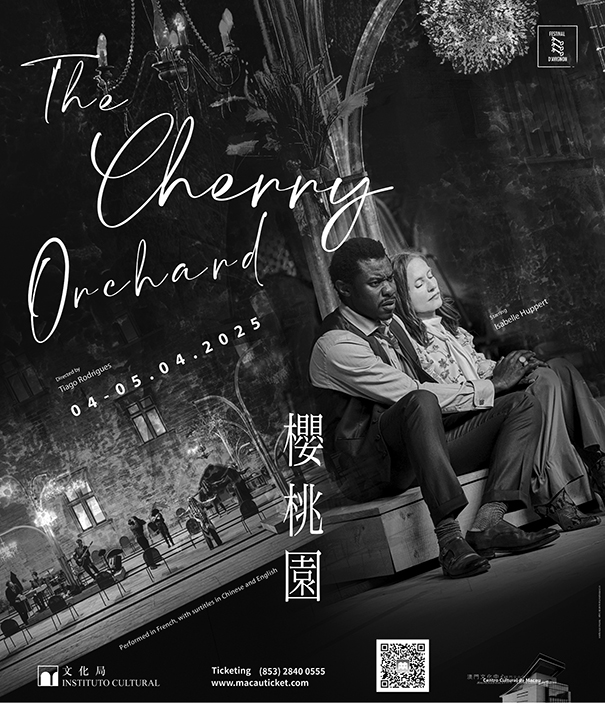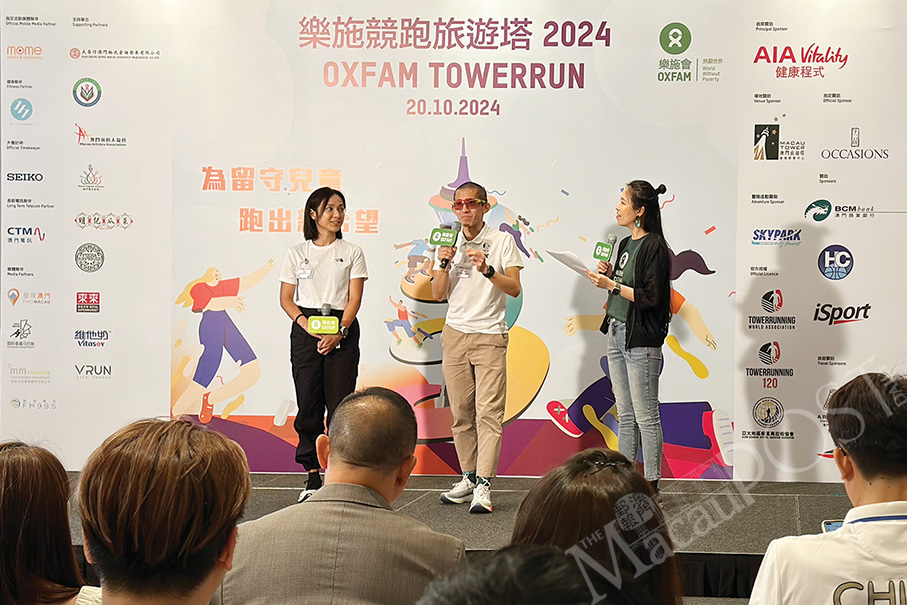US scholar Jeffrey Sachs praises China’s global development strategy
Maria Cheang Ut Meng in Qufu
JINAN – Macau’s 11-member English- and Portuguese-language media delegation, organised by the Central People’s Government Liaison Office in the Macau Special Administrative Region (MSAR) attended yesterday the first day of the 10th Nishan Forum on World Civilisations in Qufu, the birthplace of Confucius, in the northeastern province of Shandong, with the theme of Traditional Culture and Modern Civilisation.
The forum’s official aim is to provide solutions to better address global challenges and promote the progress of human civilisation.
The 10th edition of the two-day forum has attracted nearly 400 international guests from 63 countries and regions, participating in various activities including interviews, keynote speeches, and parallel dialogues.
Prominent US scholar Jeffrey Sachs, director of the Centre for Sustainable Development at Columbia University, was one of the key speakers. He strongly criticised the US administration’s anti-China policies. In a media interview on the sidelines of the forum’s opening ceremony, Sachs praised this “very important forum because it is bringing together people from all over the world to pursue shared ideals, peace and to learn about China’s great culture, to learn about Confucianism and Confucius’s wisdom, and the beauty of this civilisation.”
Sachs also said the world’s main challenge right now was “to live together peacefully. We have eight billion people in the world. The world is crowded, and there’s a lot of tension and many wars.”
Sachs, 69, an economist and public policy analyst, also said that “these wars come from a misunderstanding, a lack of true knowledge, a lack of true ethical knowledge.” He also said that many people in the US “don’t know the wonders of this [Chinese] civilisation. They don’t understand that China is not an enemy of the United States or any other place in the world. And so, this is a misunderstanding that’s very serious. And our political leaders in my country and in many others are not very responsible. They’re not very knowledgeable [either].”
Sachs added: “And they are more oriented towards war than peace. So this is the most important problem in our world today is having a mutual understanding, harmony in diversity, as Confucius said, and the ability to solve problems through diplomacy rather than through war.”
Sachs also said that the West’s claim that China’s global investment “is a way of dominating is, of course, absurd. I would say in any logical terms, China’s investment raises the incomes in poor countries. I was recently in Ethiopia where China has expanded the power supply tremendously, and I visited many poor farmers who are now making higher incomes because they had electricity. And they could actually transport their goods to market, in that case, to a market in the Middle East because China had helped to build a fast rail [link] between Addis Abeba and Djibouti. So people who make such statements that what China is doing in developing countries is somehow harmful simply don’t understand what they are talking about. They are repeating propaganda coming out of Washington.”
Sachs also pointed out that “countries need long-term finance because development is a long-term process. If you’re poor today, you’re going to be poor next year, but maybe a little bit less poor and then a little bit less poor afterwards. In the case of China, China was an extremely impoverished country in 1980. Now it’s a very, very successful economy, but that’s more than 40 years. So the key is to give long-term finance for long-term development. This is what I like to explain when I’m in China, what I’d like to explain when I’m in China, what I like to explain when I’m in Washington, when I’m in Brussels, when I’m at the IMF or the World Bank or at the United Nations, which is make the finance match the needs.”
Sachs also said he believes “that China is very keen on promoting successful development in all parts of the world. The Belt and Road Initiative is an extremely positive and important initiative. It should be welcomed by Europe. It should be welcomed by the United States. Instead, in English we say ‘they trash talk it.’ They try to turn it into a negative. It’s extremely positive and important. And the United States, if it had honesty and clarity, it would say, we will partner with China. We’ll help to spread electrification. We’ll help to spread schools. We’ll help spread fast rail. I wish we had some in the United States, by the way, fast rail. We don’t have any fast rail in the United States.”
Sachs also said that “the US elections won’t change almost anything about US policy towards China, which is very misguided, based on misunderstandings and based on lots of propaganda…. The problem is in our political class right now. The problem is getting an understanding that the United States is not the leader of the world. It can’t have its say. What it can do is cooperate peacefully with China, with Russia, with other countries, not only demand that it has its say, unfortunately, our political class is still unaware of this basic reality that the world has moved on.”
Sachs also said that “the world looks at the United States in amazement what is going on there, not in any kind of respect right now, because everyone is shocked. And so, this is the real situation. But the key is to get to that understanding without more intervening wars.”
Sachs concluded the group interview by pointing out that the “best thing that China is doing diplomatically is talking about peace and talking about sustainable development in the world. And if the US and Europe are talking about war, the more China talks about peace and harmony and diversity and sustainable development, the more the rest of the world runs in this direction to say, yes, that’s what we want. We don’t want war. We don’t want to choose sides. It’s not us versus them. We want safety, security, peace, and sustainable development. There’s just been a successful meeting of the Shanghai Cooperation Organisation…. Most of the world wants to get on, solve the climate crisis, solve the environmental; crises and poverty, benefit from the new technologies and not be told, oh, you can’t deal with this one. You can’t deal with that one. This one’s is good. That one’s evil. That’s the American approach, which is completely out of date and completely dangerous. And we need a new approach. And the best way for China is to promote that what it’s doing through initiatives like the Global Civilisation Initiative and the Global Development Initiative and the BRICS and others, and the Belt and Road Initiative, very important, which is to say we want peace, cooperation, the UN Charter, the international rule of law and sustainable development. And that will inspire the whole world.”
The forum also features six sub-themes, including Civilisational Exchange and Mutual Learning under Global Challenges. For the first time, the forum includes a sports culture forum and a family culture symposium. It will also host a Sino-Italian classical civilisations dialogue.
The Nishan Forum on World Civilisations focuses on dialogues among world civilisations and contributing to the building of a community with a shared future for mankind. The forum integrates academic, international and open dialogues as a platform for international culture and thought exchanges.
The local media delegation will return to Macau tomorrow after an almost weeklong visit to Shandong, which also included the port city of Qingdao.
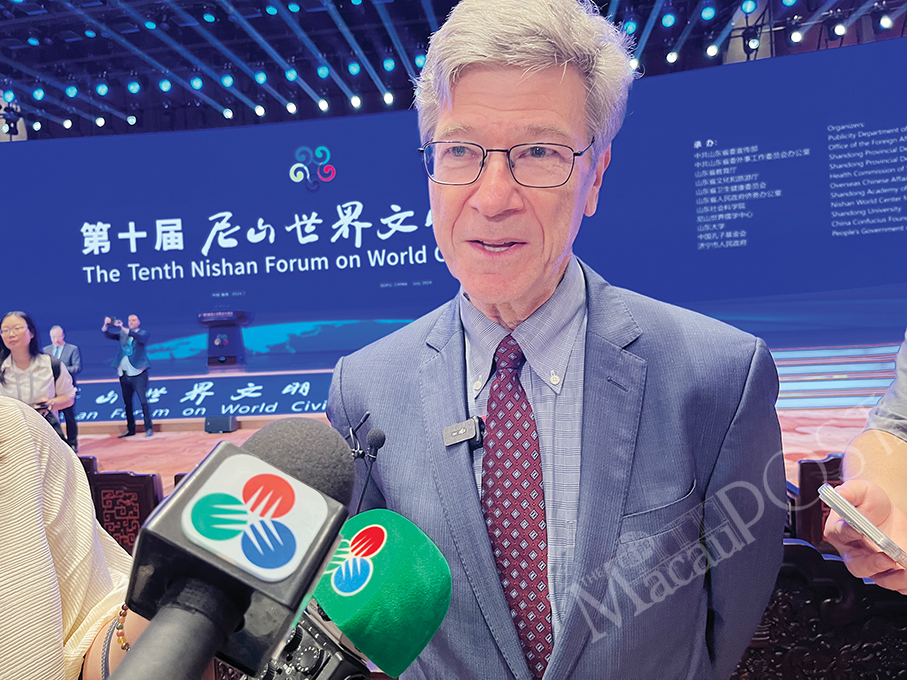
Jeffrey Sachs delivers his keynote address during the opening session of forum in Qufu yesterday morning.
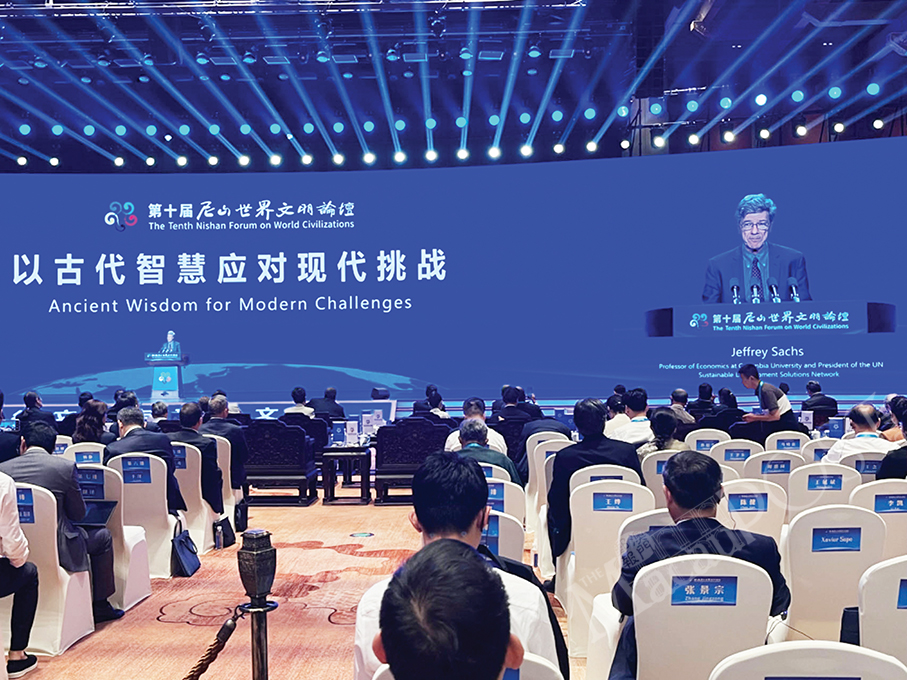
US scholar and China expert Jeffrey Sachs talks to reporters, including several from Macau, on the sidelines of the opening session of the 10th Ninshan Forum on World Civilisations in Qufu, the birthplace of Confucius, in the north-eastern province of Shandong yesterday. Sachs delivered a keynote address on the first of the two-day forum in which he criticised the US administration for its hegemonic anti-China stance. – Photos: Maria Cheang Ut Meng
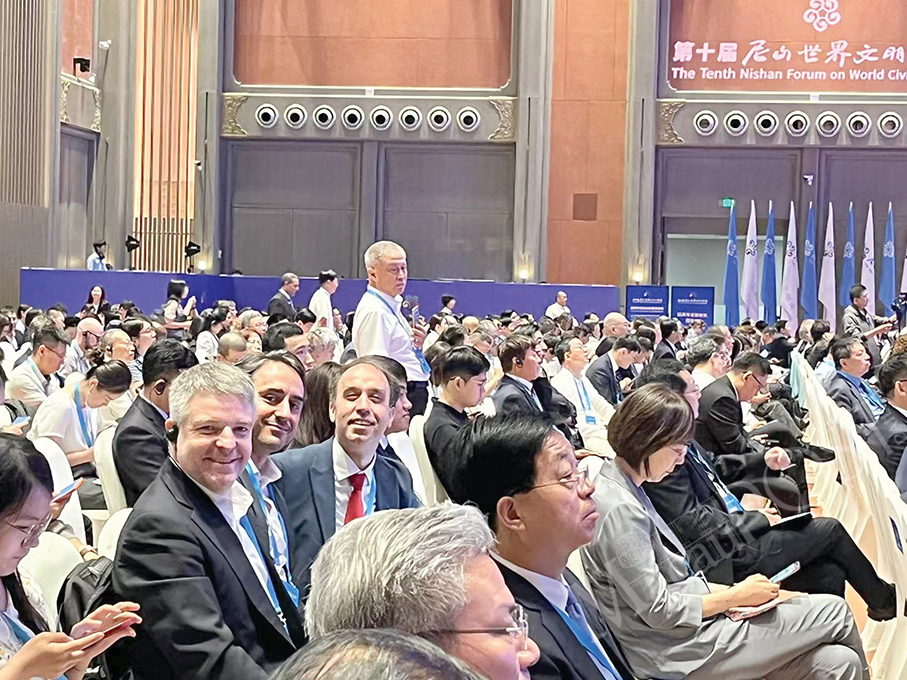
Members of the Macau press delegation are posing for a snap shot while attending yesterday’s opening session of the forum.


